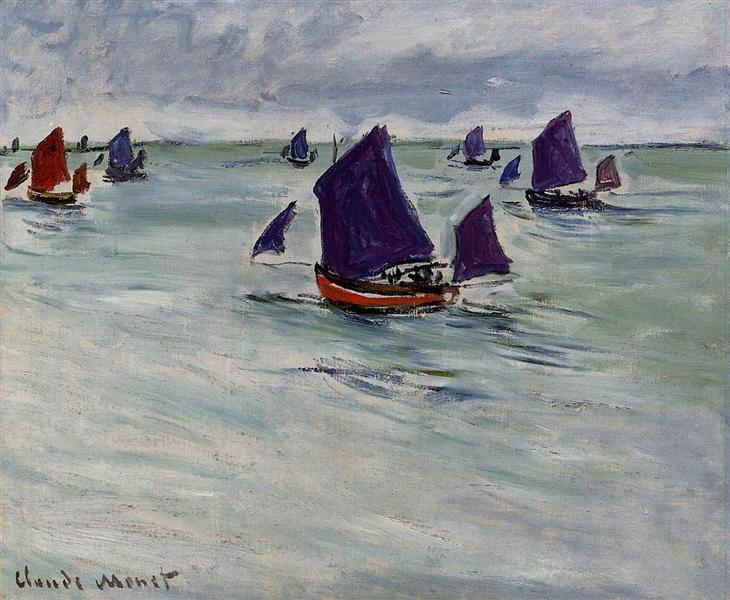Opis
Claude Monet's 1882 painting "Fishing Boats off Pourville" is a magnificent example of how the Impressionist master captures the ephemeral essence of light and the movement of the sea. This work resonates with the familiarity of coastal landscapes that Monet explored throughout his life, reflecting his deep connection with nature and his insatiable curiosity about atmospheric variations.
In "Fishing Boats off Pourville", Monet places two fishing boats at the centre of the composition, anchored off the coast, which become silent protagonists of the painting. The arrangement of these boats, one of them with a characteristic sail, establishes a kind of dialogue with the sea in full activity, where the waves slide on a horizon that seems to vibrate with the energy of the water. This dynamism is accentuated by the way Monet uses rapid brushstrokes, giving a sense of movement and an almost cinematic context to the image.
Colour plays a crucial role, with a palette evoking the freshness of the sea. Monet employs intertwining shades of blue and green, nuanced by gold and orange highlights that suggest sunlight softly illuminating the scene. The technique of Impressionism, which Monet mastered, is manifested through the loose brushstrokes that invite the viewer to experience the vivacity of the moment. This interplay between light and colour, as well as the way the sea recedes and advances, transforms the dizzying, organic experience that is so characteristic of the artist’s work.
In the background of the painting, a line of mountains looms slightly in the distance, offering a delicate contrast to the immediacy of the boats. This representation of the landscape not only acts as a backdrop, but also frames the work, suggesting the plurality of forms present in nature. Monet, with his almost lyrical approach, does not limit himself to documenting the scene, but invests it with a much deeper interpretation, related to the perception of the moment.
It is interesting to note that Monet's style during this time reflects his strong commitment to plein air, the technique of painting outdoors, which allowed him to capture the subtleties of natural light and changing atmospheric conditions. "Fishing Boats off Pourville" is not only a depiction of life on the coast, but also a testament to a time when the Impressionists sought to challenge and expand the boundaries of traditional art, breaking away from the conventions of academic painting. This link to innovation can be seen in the way Monet uses colour and texture to evoke a sense of place and time.
In conclusion, “Fishing Boats off Pourville” is a work that not only celebrates the beauty of the landscape but also invites a reflection on the ephemeral nature of the experience itself. As one of the pillars of Impressionism, Monet reminds us how light, color and form can combine to capture the essence of the world around us, making us participants in an aesthetic experience that transcends time and perception. His legacy lives on, inspiring generations of artists and art lovers, who find in his landscapes a visceral connection with nature and the intrinsic beauty of life.
KUADROS ©, a famous painting on your wall.
Hand-made oil painting reproductions, with the quality of professional artists and the distinctive seal of KUADROS ©.
Painting reproduction service with satisfaction guarantee. If you are not completely satisfied with the replica of your painting, we will refund 100% of your money.

